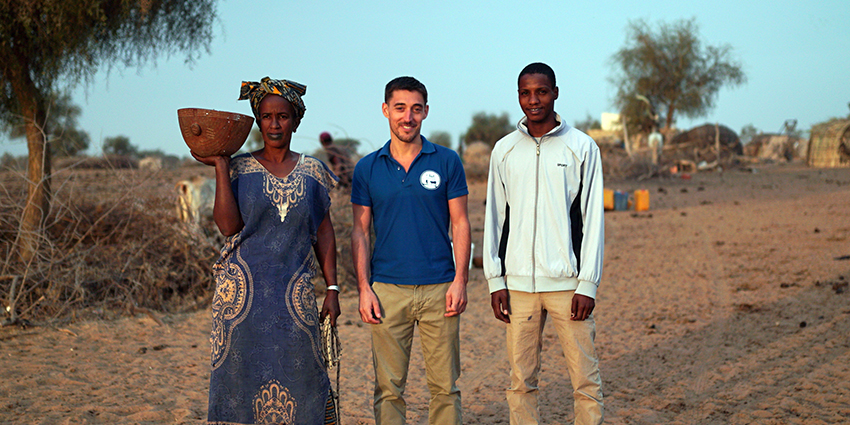KOSSAM and digital payment for breeders in Senegal

Supported by the Grameen Crédit Agricole Foundation, CA Franche Comté and Amundi, Kossam SDE is a subsidiary of Laiterie du Berger which aims to structure and strengthen the dairy sector in Senegal. In February 2020, Kossam SDE successfully launched the dematerialization of "payroll" for more than 850 breeders, thus contributing to the improvement of their living and working conditions. Spotlight on the interview for Portail FinDev with Jonathan Michaud (former Solidarity Banker [1] of CA Franche Comté) Director for 3 years of Kossam SDE), and Mamadou Fall, its Deputy Director, who look back on this transformation.
1. What was a typical payday like before the transition to digital payroll?
Jonathan Michaud & Mamadou Fall: Until February 2020, all farmers were paid in cash on one or two specific paydays. Farmers traveled to the factory in Richard Toll to collect the money owed to them. First, being paid in cash was restrictive for farmers. They had to arrive early in the morning and sometimes wait all day in high temperatures. Furthermore, farmers were forced to travel to Richard Toll on a specific day to be paid, without being able to schedule it around their other trips. It was also laborious for Kossam SDE, since the teams had to handle cash for two days under pressure due to farmers' waiting times, which could lead to errors.
In November 2019, the Kossam SDE team made the decision to digitize and the first digital payroll took place in February 2020.
2. What are the concrete benefits of digitalization for breeders?
JM & MF: We have identified 5 benefits for breeders:
- Time saving. Today, a farmer no longer needs to wait hours to receive his pay.
- Security. Everyone knew which day the farmers received their pay, which could potentially create a context of insecurity with risks of theft.
- Flexibility. Now, all breeders receive their money on the same date but can collect it whenever they want.
- Cost. Most farmers don't live in Richard Toll, and getting there comes at a cost. They can now optimize the cost of their journey by deciding which day they'll withdraw their money.
- Traceability. Each breeder is identified in our database with their phone number and ID card. This ensures that the breeder is indeed receiving the money, since we know which phone number the funds are being sent to.
3. What solution have you implemented with Wizall Money to pay breeders?
JM & MF: The vast majority of our breeders don't have smartphones. They have a basic phone that can only receive and make calls and send text messages. So we opted for a code sent directly to the breeders' phones. Armed with this code and their ID, the breeders go to the Wizall Money kiosk of their choice to withdraw their money. The fees associated with this service are borne by the beneficiaries (the breeders).
Implementing this solution has clearly removed a considerable number of constraints for breeders, particularly in terms of time and organization. Furthermore, we were concerned that breeders might be reluctant to pay to receive their money. However, the issue of cost was not addressed. On the contrary, it costs them much less than paying for transport to get to Richard Toll on a specific day of the month. We have not received any complaints in this regard.
4. More than a year after implementing digitalization, where are you now? What's next?
JM & MF: The digitalization of payroll was implemented just before the arrival of Covid-19 in Senegal in March 2020, where drastic measures were quickly taken: curfew, banned gatherings, etc. Without digitalization, farmers would not have been able to travel and would not have been able to be paid. Today, we are moving on to the second and final stage of payroll transformation. Indeed, there are two drawbacks to the SMS codes that our farmers receive on their phones: you have to have your own phone, which is not the case for all our farmers, as well as the network. The main problem encountered is that some people never received the code, so we had to continue paying them in cash.
To address this situation, we have provided all our breeders with an individual NFC card. Their pay will be sent to this card in an electronic wallet. Breeders can then go to a Wizall Money kiosk, hand over their card, enter their PIN, and withdraw all or part of their money. There are therefore no longer any network constraints and no longer any obligation to withdraw the entire amount paid. This is a major innovation that allows us to enter into new uses and services that are a form of micro-savings and passive savings.
We will now work on various topics that digitalization allows us to address with greater efficiency and peace of mind: access to health insurance, development of savings and financial education.



Leave a Reply
Want to join the discussion?Feel free to contribute!